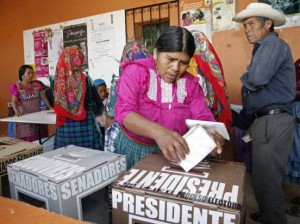Current Election Coverage
It’s been a whirlwind week for the Americas Program, writing on the Mexican elections before, during and after. This post provides on-the-scene accounts of voting day from Oaxaca, Mexico City and Mexico State, as well as an in-depth analysis of what it all means by Americas Program director, Laura Carlsen. It has background on the historic “I am 132” student movement for democracy. We also provide links (below) to some of the many interviews with international media (NBC Nightly News, Pacifica, NPR, Telemundo, Al Jazeera, CCTV) we have done over the past week so you can listen and watch.
Meanwhile, we continue toward our goal of surviving past this year. So far donations have been a little slow. We thank those of you who have responded YES to our readers’ referendum on the future of the program, but to make it we will need more help. We’ll be announcing a matching fund, so this is the time to give and have your donation count double. Please donate to keep the Americas Program going.
Laura Carlsen’s Multimedia coverage:
NBC Nightly News: http://www.msnbc.msn.com/id/
Telemundo July 2: https://www.youtube.com/watch?v=XhMqW6-srMY&feature=player_embedded
Telemundo June 27: http://www.youtube.com/watch?
CCTV Americas Now on Mexican, US and Venezuelan elections: http://www.youtube.com/watch?
Pacifica Uprising Radio: http://ia700305.us.archive.
This is Hell! WNUR Chicago, Laura Carlsen on Mexico and Honduras: http://thisishell.net/shows/
CIP coverage from the field:
From the “Perfect Dictatorship” to the Imperfect Democracy
By Laura Carlsen
If Mexico’s electoral authorities confirm the preliminary vote, Mexico will have gone from a “perfect dictatorship” to an imperfect democracy,with the return to power of the party that ruled for 71 years almost without rivals.
The numbers reported by the preliminary system show that the candidate of the Institutional Revolutionary Party (PRI), Enrique Peña Nieto, garnered 38.1% of the vote, followed by Andrés Manuel López Obrador of the Party of the Democratic Revolution (PRD) with 31.6%. The conservative National Action Party of President Felipe Calderón trailed at a distant third with 25.4%.
What can be said about the results?
Even without the final results, we can draw some conclusions from the elections of July 1, 2012.
Observing in Ecatepec–Who’s in Charge Here?
By Lisbeth Rasch
The word sounds like cracking something up inside your mouth, but it’s a poor suburb of Mexico City, and my Mexican friends tell me going there is like going to hell. That’s where I decided to observe the Mexican elections.
Apart from its reputation as a dirty, depressive and dangerous suburb, Ecatepec is–with its 2 million inhabitants–the biggest municipality in the State of Mexico and has long been a stronghold of the PRI party (Institutional Revolutionary Party). People tell me it’s a place where ”mapaches” are common – a word literally meaning raccoon but in Mexican electoral jargon referring to those charged with creative and sometimes aggressive attempts to buy votes and political loyalties.
Denied the Right to Vote in Mexico’s Presidential Election
By Kristin Bricker
…In the end my husband, along with hundreds of others, was unable to vote because the government had provided the Special Voting Booths with so few ballots. Those who are forced to vote in the Special Voting Booths instead of their designated polling stations are those who have been harmed the most by the federal government’s policies. They are Mexico’s internal refugees, displaced by the violence and insecurity that the current president unleashed when he deployed the military in the war on drugs. They are the unemployed who were forced to travel to look for work because there was none at home, thanks to the president’s disastrous economic policies. They know better than anyone else what is wrong with the federal government’s policies because they have lived it in flesh and blood, yet on July 1 they were denied their constitutional right to vote for the next president.
Pre-Election Coverage
We are all 132! Mexico’s Student Movement for Defense of the Vote
by Vanessa Garcia
For Enrique Peña Nieto, the leading candidate in Mexico’s upcoming election, the worst day of his presidential campaign was the day that sparked “#Yo soy 132” (I am number 132), a youth movement for social justice. When the candidate visited Iberoamerican University–a private, Jesuit-run college in Mexico City–last month, a crowd of young people stood up and called him “coward,” “liar,” and “assassin.”
A Mexican Student Movement Is Born With Elections Looming
By Abigail Thornton
A nascent student group calling itself Yo Soy 132 (or I Am 132) held its second national march June 10, in protest of Mexican presidential candidate, Enrique Peña Nieto. Estimates had the crowd numbers in Mexico City alone at over 90,000.
Third March to Protest PRI Candidate
By Yasmin Khan
With one week until the Mexican presidential elections, thousands of people turned out for the third large march against Enrique Peña Nieto, candidate for the Institutional Revolutionary Party (PRI). Protesters carrying signs, beating drums, and chanting “Fuera Peña” marched from Mexico City’s Zocalo down Reforma Avenue to the Angel of Independence June 24. The demonstration was organized by the student movement “Yo Soy 132” and other pro-democracy and human rights organizations.
Mexico’s Long and Bloody Electoral Road
By Kent Paterson
Mexico’s transition from the 20th century authoritarian state of the Institutional Revolutionary Party (PRI) to an uncertain democracy has been a bloody affair. And it continues to be in the 2012 electoral year.




